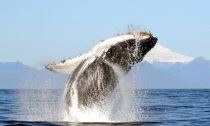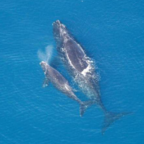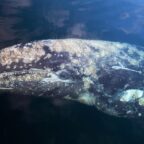
The International Whaling Commission (IWC) was founded to regulate whaling. Today, it increasingly focuses on the value of live whales for planetary health. A new workshop report confirms the great ecological value of whales to help mitigate climate change, transport nutrients, enhance marine productivity, and promote biodiversity in marine ecosystems.
The world’s leading experts gathered for a three-day workshop in April that was co-hosted by the IWC and the Convention on the Conservation of Migratory Species of Wild Animals (CMS). The meeting came in response to a 2016 IWC resolution, introduced by the government of Chile, to compile scientific information about the ecological roles of cetaceans (whales and dolphins).
The workshop discussions focused on a number of primary ecosystem functions of cetaceans: nutrient transport both in the water column and between their foraging and breeding grounds, the impact of whale falls (when whales die and sink to the seafloor) on biodiversity and carbon sequestration, and the role of cetaceans as predators and prey. A series of expert presentations provided compelling evidence of the multi-faceted and beneficial impacts of cetaceans on marine ecosystems, such as their contribution to ocean productivity through their excrement (which can impact fishing yields) and their large bodies acting as carbon sinks (which can contribute to combating climate change).
“It is meaningful that the commission embraced the principles of the resolution that we proposed in 2016 for the protection of these marine mammals,” said Jose Fernandez, Chilean commissioner to the IWC. “It is a strong recognition — of a permanent and visionary nature — about the need and obligation of our society to strengthen an ethical imperative. Its effects will translate into an instrument of enormous effectiveness for the protection and sustainable use of marine resources and ocean ecosystems, as well as to tackle the harmful effects of climate change.”
“Scientific evidence demonstrating the valuable role of cetaceans as ecosystem engineers, including their ability to sequester carbon and enhance biodiversity, is expanding each day,” said Dr. Joe Roman, a conservation biologist at the Gund Institute for Environment at the University of Vermont and the lead author of a primary report prepared for the workshop. “It is critical that the IWC and its members consider this evidence as part of their ongoing efforts to manage and recover cetacean populations.”
The workshop highlighted how commercial whaling has contributed to the slaughter of nearly 3 million whales in the 20th century alone, significantly diminishing the animals’ ability to mitigate climate change. As some whale populations have recovered following decades of protection, they have resumed their role in sequestering carbon. However, that beneficial role continues to be hindered by other threats to cetaceans, particularly bycatch in fishing gear.
“Commercial whaling not only caused the extinction or near extinction of several whale populations, but it also resulted in the catastrophic loss of their ecosystem benefits,” said Sue Fisher, marine animal consultant for the Animal Welfare Institute. “We must learn from the mistakes of the past and, for the sake of the whales and ocean health, end commercial whaling once and for all.”
“As the world grapples with the dire consequences of climate change, it is imperative that all solutions — large and small — are considered to mitigate these threats,” said Steven Lutz, senior program officer and blue carbon lead at GRID-Arendal, a United Nations Environment Programme partner based in Norway. “Protecting cetaceans is essential to promoting oceanic blue carbon as a nature-based solution to our changing climate, and it’s time for the governments of the world to recognize this important value at the United Nations climate change conference in November.”
“The decimation of cetacean populations over the last 200 years has knocked the marine ecosystem out of balance,” said Astrid Fuchs, policy manager at Whale and Dolphin Conservation. “We now know that by helping whale and dolphin populations recover, they can help to heal the ocean as part of a nature-based solution to climate and ecological emergencies. For this to happen, the IWC and its member countries must urgently strengthen protections for cetaceans, reducing the risks from bycatch, whaling, pollution and ship strikes, and creating safe places for them to live and breed.”
“During the last five decades (i.e., within a whale species’ life expectancy), humans have come to learn about their intelligence, social complexities, and whale culture. Now, science reveals more and more about their important role for a healthy ocean and nature-based solution to climate change,” said Fabienne McLellan, co-director of international relations at OceanCare focusing to end direct hunts. “While whales became THE symbol for the environmental movement in the 1970s, they should be truly treated as THE symbol for our ocean as our life-support system. We need to protect them with all our efforts, as our life depends on them.”
Background
The workshop was organized in response to a 2016 IWC Resolution, which “recognized the need to include consideration of the contributions made by live cetaceans and carcasses present in the ocean to marine ecosystem functioning in conservation, management strategies, and decision making.” The resolution asked the IWC Scientific Committee to develop a gap analysis in regards to research related to cetaceans and ecosystem functions and to develop a plan to prioritize research needs. The resolution also directed IWC member countries to consider the contributions of cetaceans to ecosystem functioning in their conservation and management decisions.
Workshop participants noted that interest in the issue of ecosystem functioning of cetaceans, particularly in the context of climate change, has gained momentum internationally and will likely increase. Discussions about “blue carbon” (the carbon naturally captured, stored, and sequestered in coastal and marine ecosystems) and “nature-based solutions” to climate change (using tools that nature provides to protect, sustainably manage, and restore natural or modified ecosystems) are of interest to stakeholders, especially environmental NGOs and decision-makers.Media Contact
- Marjorie Fishman, Animal Welfare Institute, (202) 446-2128, margie@awionline.org,
- Elsa Cabrera, Centro de Conservación Cetacea, +56992205225, info@ccc-chile.org
- Astrid Fuchs, Whale and Dolphin Conservation, +49 176 992 441 44, astrid.fuchs@whales.org
- Fabienne McLellan, OceanCare, +41 79 456 77 07, fmclellan@oceancare.org
Animal Welfare Institute
The Animal Welfare Institute (awionline.org) is a nonprofit charitable organization founded in 1951 and dedicated to reducing animal suffering caused by people. AWI engages policymakers, scientists, industry, and the public to achieve better treatment of animals everywhere – in the laboratory, on the farm, in commerce, at home, and in the wild. Follow us on Facebook, Twitter and Instagram for updates and other important animal protection news.
Whale and Dolphin Conservation
WDC, Whale and Dolphin Conservation, is the leading global charity dedicated to the conservation and protection of whales and dolphins. We defend these remarkable creatures against the many threats they face through campaigns, lobbying, advising governments, conservation projects, field research and rescue.
Centro de Conservación Cetacea
The Centro de Conservación Cetacea (www.ccc-chile.org) is a Chilean non-profit organization dedicated to the conservation of marine mammals and their aquatic ecosystems. It has been advisor to the Chilean government at the International Whaling Commission (IWC) since 2001 and has promoted the adoption of key resolutions at IWC, including resolutions on the contribution of cetaceans to the ecosystem functioning.
OceanCare
OceanCare has been committed to marine wildlife protection since 1989. Through research and conservation projects, campaigns, environmental education, and involvement in a range of important international committees, OceanCare undertakes concrete steps to improve the situation for wildlife in the world’s oceans. OceanCare holds Special Consultative Status with the Economic and Social Council of the United Nations (ECOSOC) and, among being accredited to a number of international fora and Multilateral Environmental Agreements, OceanCare has also been an observer at the IWC since 1992. www.oceancare.org














Social Profiles